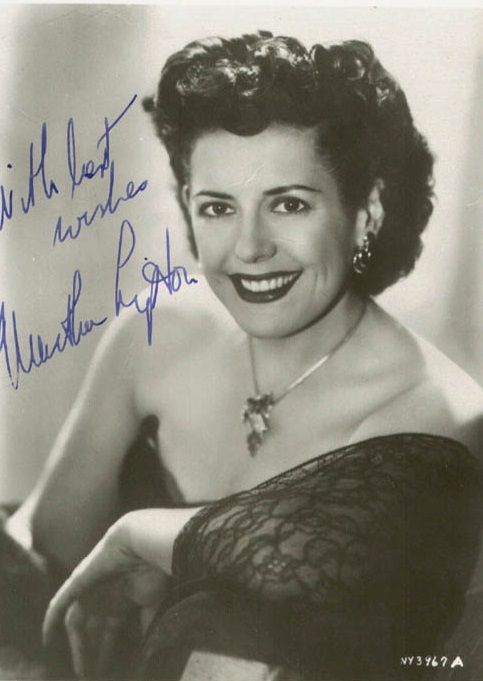

| Classic Arts News Mezzo-Soprano Martha Lipton Dies at
93
Lipton was born in 1913 in New York City and won a scholarship to Juilliard. She made her debut in 1941 as Pauline in Tchaikovsky's Queen of Spades with Manhattan's now-defunct New Opera Company. In February 1944 Lipton sang Nancy in Flotow's Martha during the inaugural season of New York City Opera; she made her Met debut about seven months later, as Siebel in Gounod's Faust on opening night of the 1944-45 season. Lipton sang regularly with the company for 17 seasons; her more than 400 performances included regular appearances as Annina in Der Rosenkavalier and Emilia in Otello. She sang Mrs. Sedley in the Met premiere of Peter Grimes in 1948, Mother Goose in the company's first performances of The Rake's Progress in 1953 and Madame Larina in the 1957 Peter Brook staging of Eugene Onegin. Lipton's final appearance with the Met was as the Innkeeper
in Boris Godunov in 1961, but she returned as an honored
guest for the galas marking the closing of the Old Met in 1966 and the company's
centennial in 1983, according to Opera News. Lipton also sang the title role in Benjamin Britten's Rape of Lucretia in 1954 performances with the English Opera Group. She originated the role of Augusta in Douglas Moore's The Ballad of Baby Doe at the Central City Opera House in Colorado in 1956, repeating the performance the following April with New York City Opera. She was active as a recitalist and concert soloist and sang on major recordings for Columbia Records, including Mahler's Third Symphony, with Leonard Bernstein leading the New York Philharmonic, and Bruckner's Te Deum led by Bruno Walter. She also recorded Aaron Copland's Twelve Poems of Emily Dickinson, with the composer at the piano. At the time of her death, Lipton was living in Bloomington,
where she was a professor emeritus at Indiana University's School of Music,
whose voice faculty she joined in 1960. == Another biography with some further details of her career appears at the bottom of this webpage. BD |
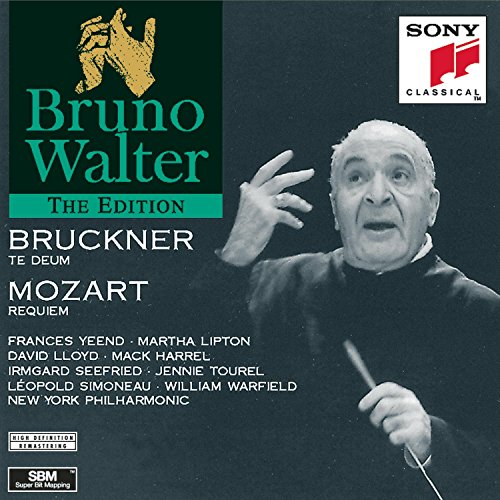
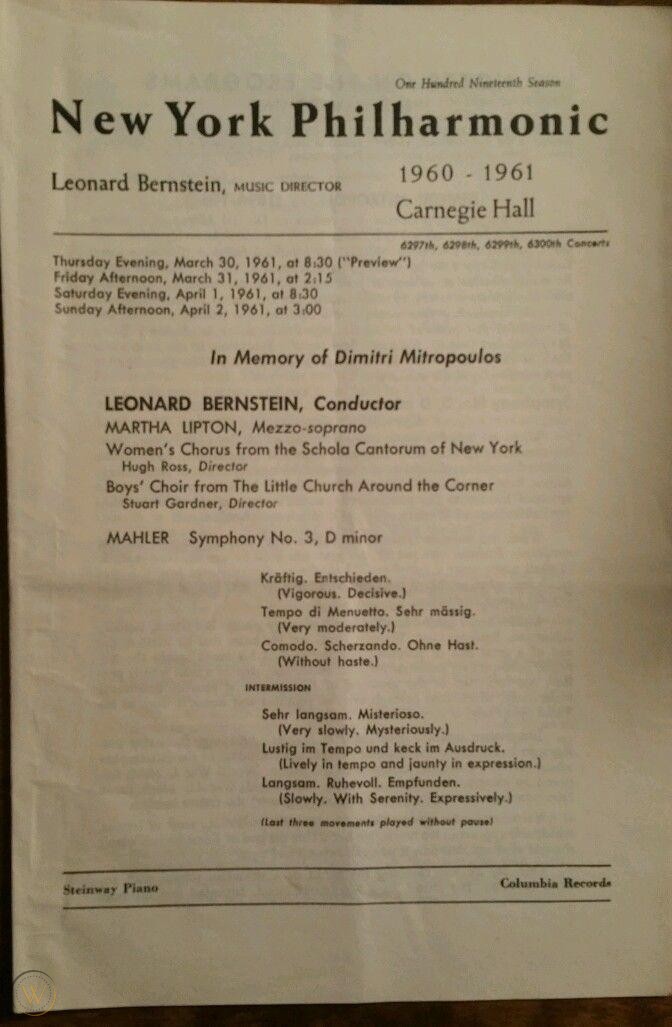
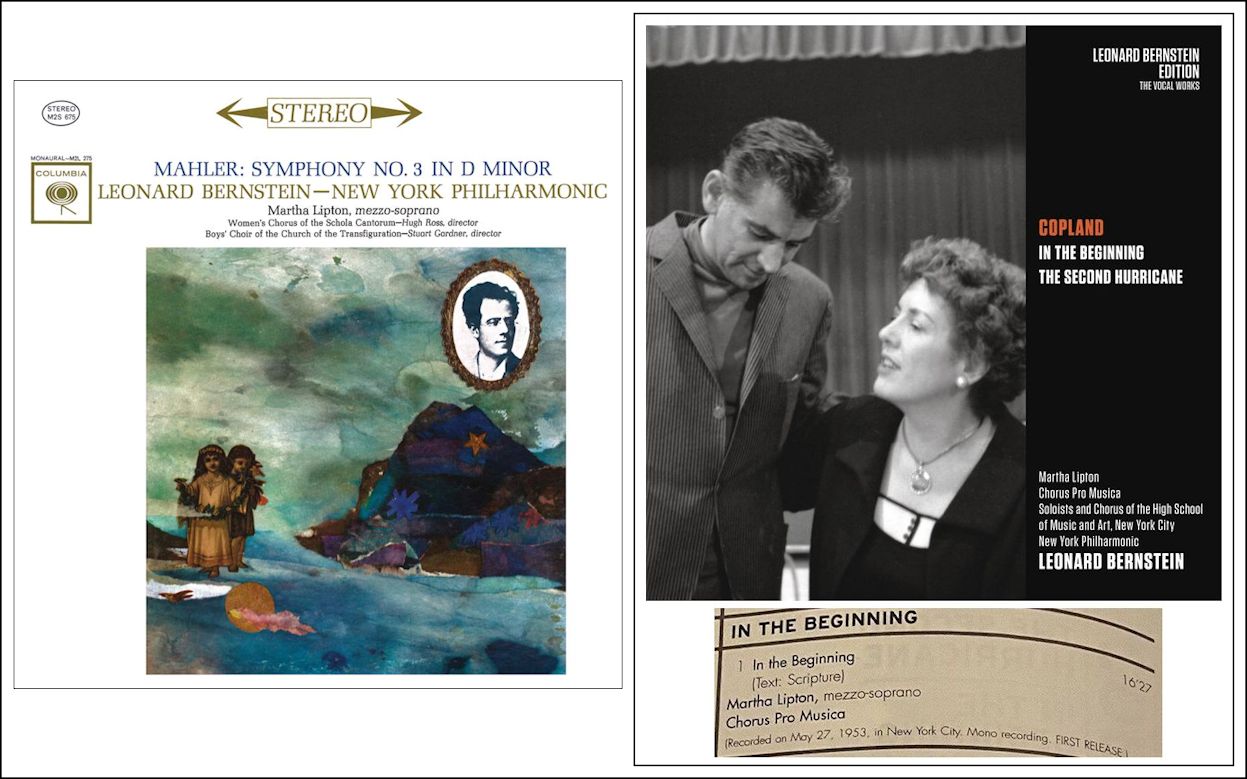
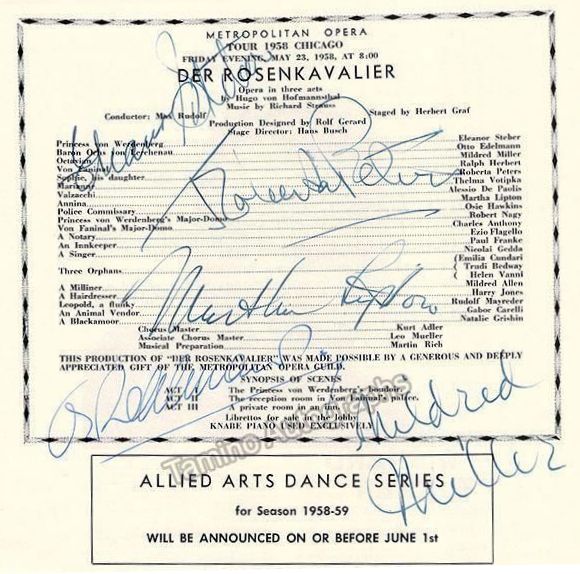
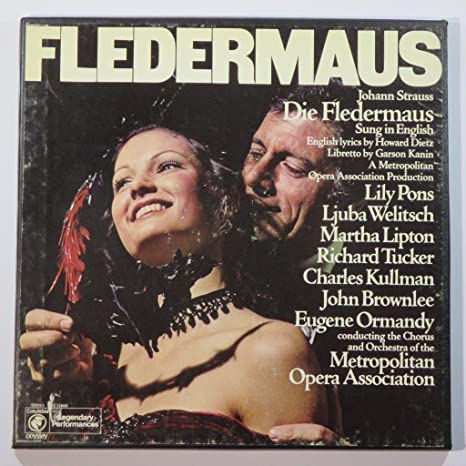
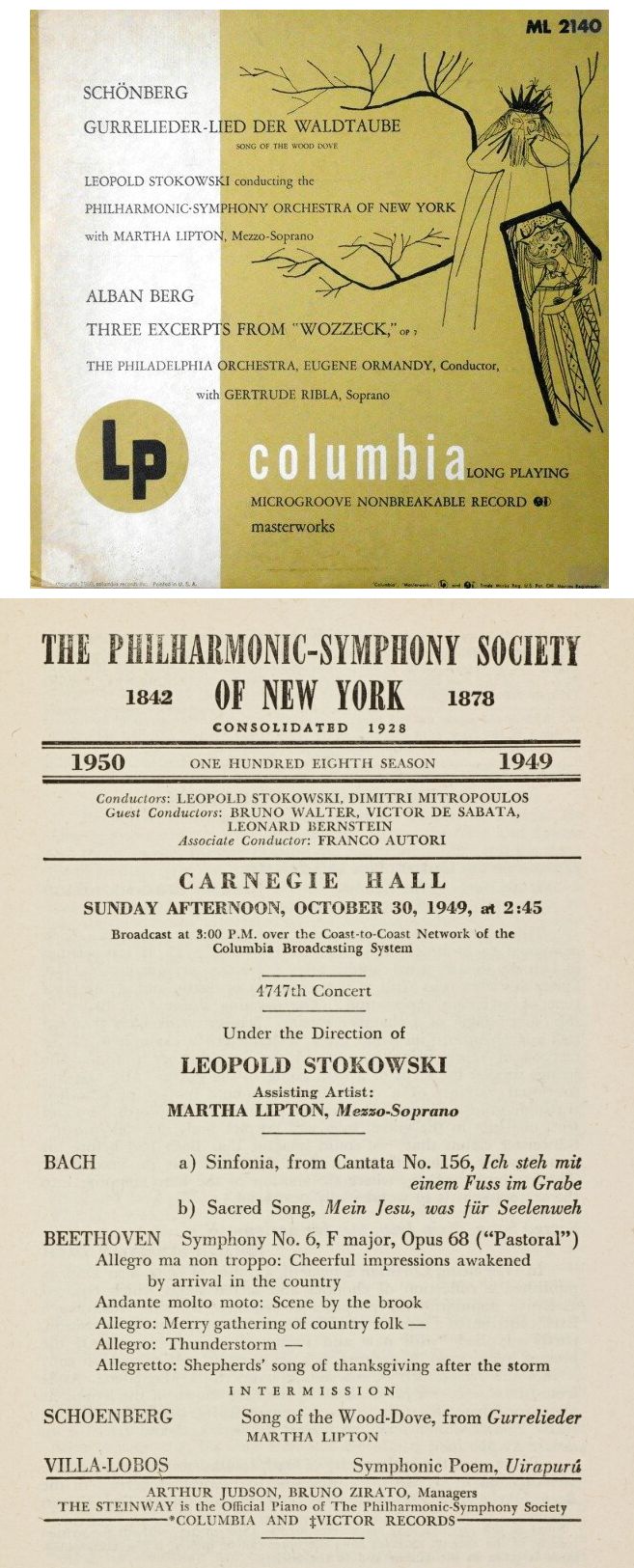
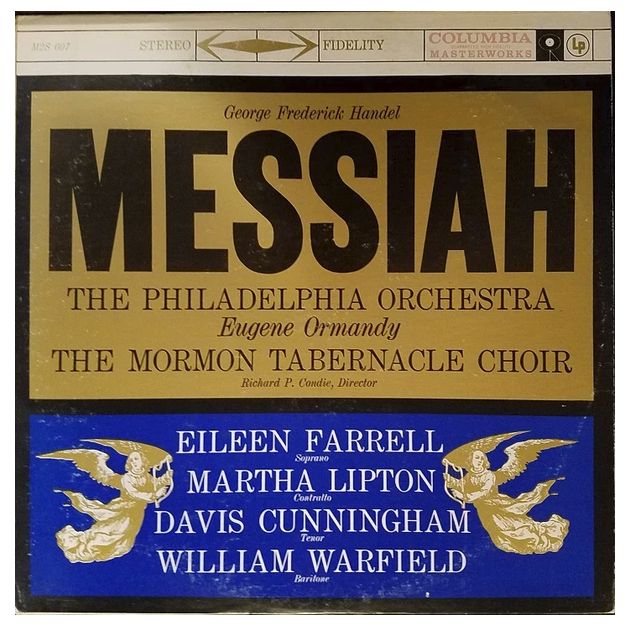 Lipton: That question is interesting, because when I was
a kid, my mother used to tell me about Marcella Sembrich, and about Sigrid
Onégin, and Mattia Battistini, the great voices of that time. She
would say, “There’s nothing like that today,”
as she was dragging me to the opera to hear Rosa Ponselle. When
I was growing up, that’s what I heard. I never heard Caruso, but Rosa
Ponselle was my great love. That was one of the most beautiful sounds
ever created, and I always tried to sing like she did. So, I’m saying
to this generation, “There’s nobody like the past
generation,” and I’m sure that when I’m gone they’re
going to say, “There’s nobody like the past
generation today.” [Both laugh] Each
generation has its beauties and its favorites. Today we have some
very beautiful voices. We have Joan Sutherland,
and Marilyn Horne, but
it’s only a handful. But there’s only a handful in any generation.
If you look back, there are only a handful of artists in any field,
so you can just say that’s the way it is. Great artists are in the
minority. It’s always been so, and it always will be so.
Lipton: That question is interesting, because when I was
a kid, my mother used to tell me about Marcella Sembrich, and about Sigrid
Onégin, and Mattia Battistini, the great voices of that time. She
would say, “There’s nothing like that today,”
as she was dragging me to the opera to hear Rosa Ponselle. When
I was growing up, that’s what I heard. I never heard Caruso, but Rosa
Ponselle was my great love. That was one of the most beautiful sounds
ever created, and I always tried to sing like she did. So, I’m saying
to this generation, “There’s nobody like the past
generation,” and I’m sure that when I’m gone they’re
going to say, “There’s nobody like the past
generation today.” [Both laugh] Each
generation has its beauties and its favorites. Today we have some
very beautiful voices. We have Joan Sutherland,
and Marilyn Horne, but
it’s only a handful. But there’s only a handful in any generation.
If you look back, there are only a handful of artists in any field,
so you can just say that’s the way it is. Great artists are in the
minority. It’s always been so, and it always will be so.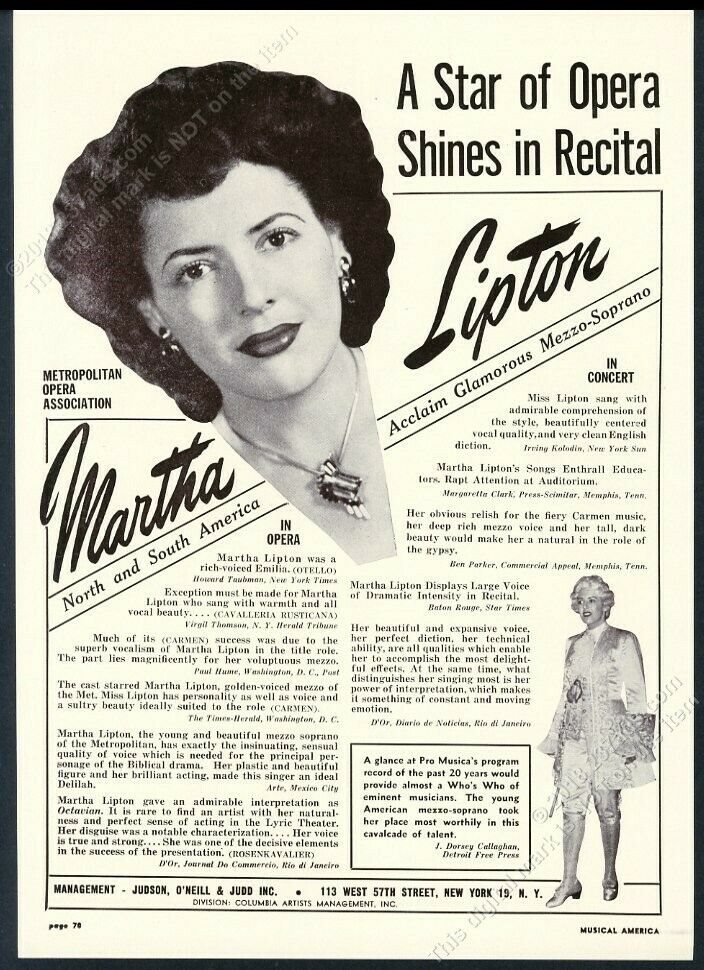
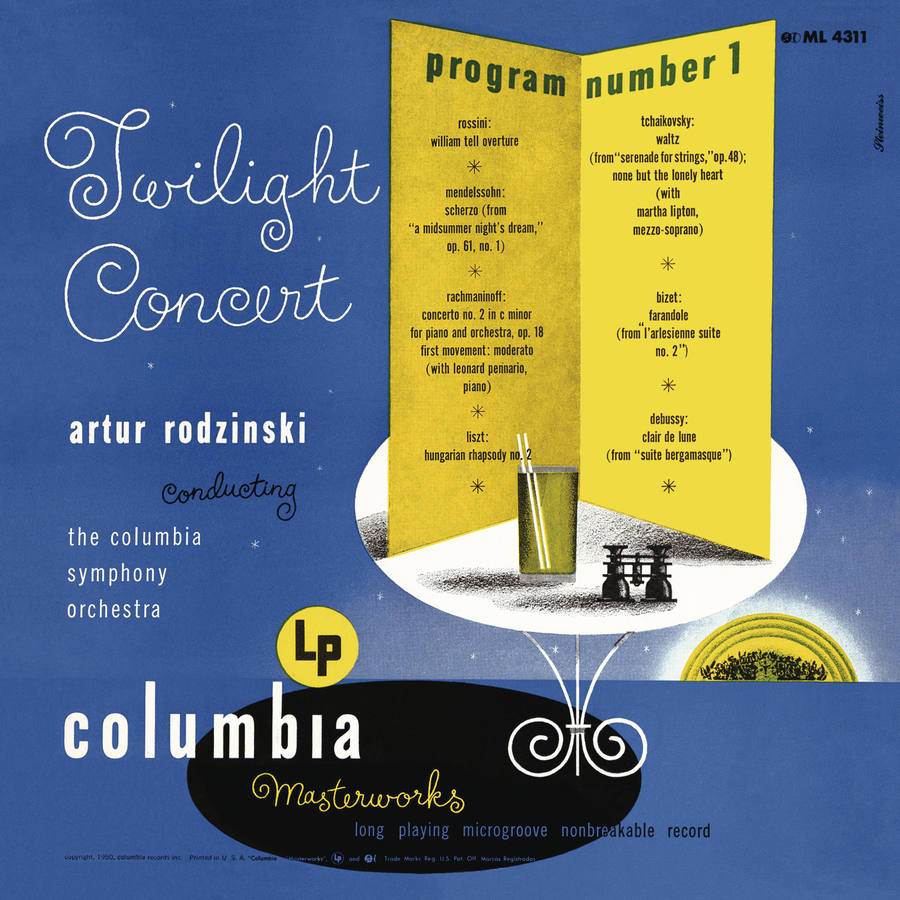
| Martha Lipton Born: April 6, 1913 - New York City, New York, USA Died: November 28, 2006 - Bloomington, Monroe County, Indiana, USA The American mezzo-soprano and music pedagogue, Martha Lipton, won a scholarship to the Juilliard School and made her debut as Pauline in Tchaikovsky's opera The Queen of Spades for the New Opera Company in Manhattan in 1941. In February 1944 Martha Lipton sang Nancy in Flotow's Martha during the inaugural season of New York City Opera; she made her Met debut about seven months later, on November 27, 1944, as Siebel in Charles Gounod's Faust on opening night of the 1944-1945 season. She went on to appear 401 times in 17 seasons at the Metropolitan Opera. She was a hit as the prostitute Maddalena in Verdi's Rigoletto though over the course of her career her most frequent assignments at the Met were as Annina in Der Rosenkavalier and Emilia, Desdemona's maid from Verdi’s Otello. A 1948 performance of the latter, which starred Ramon Vinay, Licia Albanese, and Leonard Warren, was the first complete opera ever telecast. She also performed as Mrs. Sedley in the Met’s premiere of Benjamin Britten’s Peter Grimes in 1948, Mother Goose in the company’s first performance of Igor Stravinsky’s The Rake's Progress in 1953, and Madame Larina in the 1957 Peter Brook staging of Eugene Onegin. Her final appearance at the Met was as the Innkeeper in Modest Mussorgsky’s Boris Godunov on January 7, 1961, but she returned to sing as an honored guest for the galas marking the closing of the Old Met in 1966 and the company's centennial in 1983. Lipton also sang in Europe, and earned praise in important European venues including London, Paris, and Vienna. In 1954 she sang the title role in B. Britten’s The Rape of Lucretia for the English Opera Group. On July 7, 1956 she originated the role of Augusta Tabor in the world premiere of Douglas Moore’s seminal opera The Ballad of Baby Doe at the Central City Opera House in Colorado, repeating the performance the following April with New York City Opera. Martha Lipton was active as a recitalist and concert soloist, and during the 1950’s as a recording artist for Columbia Records. Her recordings with Columbia included Gustav Mahler's Symphony No. 3, featuring Leonard Bernstein leading the New York Philharmonic Orchestra and Bruckner's Te Deum led by Bruno Walter. Beethoven’s Symphony No. 9 with Bruno Walter conducting the New York Philharmonic Orchestra. With Aaron Copland at the piano, she recorded his Twelve Poems of Emily Dickinson. One of her best-known recordings was George Frideric Handel’s Messiah in the 1958-1959 recording with Eugene Ormandy and the Philadelphia Orchestra and the Mormon Tabernacle Choir. She can also be heard on a number of archived Metropolitan broadcasts, including Johann Strauss’ Die Fledermaus; Stravinsky’s The Rake's Progress (Fritz Reiner, 1953), Tchaikovsky’s Eugene Onegin; Verdi’s Otello, Macbeth, Falstaff (Fritz Reiner, 1949), Rigoletto, La forza del destino, Wagner’s Tristan und Isolde, Das Rheingold, Die Walküre, Götterdaemmerung, Mozart’s The Magic Flute; Strauss’ Der Rosenkavalier (Fritz Reiner, 1949), Elektra (Fritz Reiner, 1949/1952/1953), Arabella; Gounod's Faust; Mascagni’s Cavaleria Rusticana; Giordano’s Andrea Chènier; Puccini’s La bohème; Bizet’s Carmen. Martha Lipton was professor emeritus at Indiana University's School of Music, whose voice faculty she joined in 1960. She retired from full-time teaching to Professor Emerita status in 1983, but continued teaching part-time until her death. She died in Bloomington, Indiana on November 28, 2006, at age 93. == From the Bach Cantatas website
|
© 1994 Bruce Duffie
This conversation was recorded on the telephone on January 10, 1994. Portions were broadcast on WNIB in 1998. This transcription was made in 2021, and posted on this website at that time. My thanks to British soprano Una Barry for her help in preparing this website presentation.
To see a full list (with links) of interviews which have been transcribed and posted on this website, click here. To read my thoughts on editing these interviews for print, as well as a few other interesting observations, click here.
Award - winning broadcaster Bruce Duffie was with WNIB, Classical 97 in Chicago from 1975 until its final moment as a classical station in February of 2001. His interviews have also appeared in various magazines and journals since 1980, and he now continues his broadcast series on WNUR-FM, as well as on Contemporary Classical Internet Radio.
You are invited to visit his website for more information about his work, including selected transcripts of other interviews, plus a full list of his guests. He would also like to call your attention to the photos and information about his grandfather, who was a pioneer in the automotive field more than a century ago. You may also send him E-Mail with comments, questions and suggestions.